The secret to improve your communication through the mask
Wearing a face mask will completely change nonverbal communication since the nose and mouth will be covered.

The Woman Post | Carolina Rodríguez Monclou
Listen to this article
According to Andrea Vilallonga, Image and Communication Consultant, 55% of the message transmitted among people focuses on facial expressions, making it clear that the mandatory use of masks will produce a significant communication loss.
For this reason, from now on, we will need to focus our attention on body language, such as the movement of eyes, eyebrows, head, and body itself to understand better the message.
Vilallonga has dedicated most of her career, helping people to take conscious of the image that they inspire and the impact they wish to have. The Woman Post reunited with the CEO of Andrea Vilallonga School to talk about how to improve our communication through the mask.
The Woman Post: How did you become a speaker?
Andrea Vilallonga: Teaching is something that I have always enjoyed, and also helping others is the purpose of my work. I invited the method “Mírate” (Look at you), even the name of my first book. Thanks to this, I could give a speech about this titled “Enamórate” (Fall in love) at a TED Talks event. From this experience, I realized that I enjoy talking to big groups and getting immediate reactions from the public. It has been an evolution.
Her method “Mírate” consists in learning how to love yourself through acceptance, improving communication with others, clarify what you want to convey with your image, find what makes you unique, brings out the best in you, and elevate self-esteem.
TWP: Do you think that our communication has changed due to the pandemic?
AV: Absolutely, and not only for the use of the mask that modifies our nonverbal language and the projection of the voice but also for the boom of virtual communication. This channel brings with it a lot of advantages as well. I think that the combination of virtual and face-to-face communication is terrific for managing our work in a more personal and healthy way for people who can work from home. However, the mask will change the nonverbal communication as we knew it.
TWP: Why the use of the mask will change the communication as we knew it?
AV: We will be more conscious about the way we move, gesture, and look with the only intention that our listener can understand the message that we are trying to share. Because of this, we will learn to emphasize in our body language so people can understand us better. Our gestures will become a little more exaggerated.
Also read: The secret to transcending the difficulties and challenges that life presents
TWP: How can we compensate for the communication loss caused by the mask?
AV: Making emphasis in our body language. I see this situation as an opportunity to pay attention to the person that is talking to us. Before, as we could saw the facial expression, it was easier to understand the message; that’s why sometimes maybe we weren’t focusing our attention on our partner. The mask will help us to put more emphasis on nonverbal communication.
TWP: Will we get used to this body language emphasis after the pandemic?
AV: Well, it’s not like we will keep that emphasis without the mask because our gestures would be very theatrical. What we can do is expand those communicative gestures and know that we can communicate in different ways, with or without masks. You learn to be flexible in your communication, and with this, you are showing empathy. The idea that you talk to a little kid, your boss, and your mom is very different. If we are conscious about this, we can connect better with people.
TWP: How is this going to affect the way that kids will communicate in the future?
AV: Kids adapt quickly to changes, even more than adults. For example, the youth invented a new way of communication through emoji faces. I think children accept new things as something positive. New generations will allow us to reinvent ourselves and to revolutionize our future.
TWP: Why do you consider active listening and empathy as keys for excellent communication?
AV: A communication that lacks empathy and active listening is not a conversation is a monologue. Understanding allows us to help and manage the emotions of the other person and understand what others feel. Active listening provides as to prove to our partner that we are in contact with them, and we are interested in what they are saying, that’s why both of these are so essential.
TWP: How the mask affects the voice?
AV: With the mask, we will need to work more in our voice projection and vocalization because it gives us a sensation of lack of fluency. As the volume of our voice is lower, we make a more significant effort. We also make this when we talk by phone, as the other person cannot see us, we make a vocal effort to compensate for the absence of nonverbal communication.
TWP: What do you recommend to people to improve their communication despite the mask and social distancing?
AV: I recommend them to emphasize their non-verbal language, work on voice, projection, and vocalization, and above all, give an intention to their messages. There’s nothing more helpful than a person that wants to communicate with you, and they show their interest. So focus on your plan, get prepared, and focus on the nonverbal message.
TWP: Thanks to the actual situation, will we be more conscious about what we communicate?
AV: Well, I would love it if we could learn how we can communicate better rather than being conscious of what we teach. Masks won’t help us better understand what others say, but they will improve our ability to talk more clearly and be mindful of the message we want to share.




